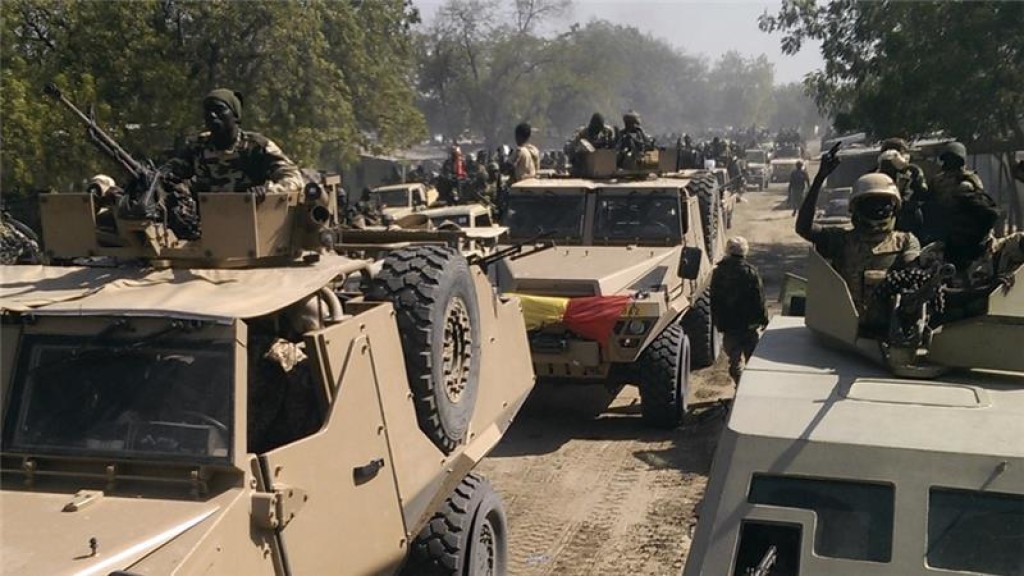
Many of the victims that were killed during the overnight attacks were women and children, according to the BBC. The news service quoted a Nigerien official who said that along with killing civilians, “the militants had burnt down several houses.” Boko Haram has yet to comment on the attack.
The Diffa region of Niger, which sits in the southeast of the country, borders Nigeria’s volatile Borno state. Boko Haram attacked this region back in February when it assaulted the town of Bosso. The militants were able to enter the town, however, Nigerien military officials said that its forces drove the attackers back, “killing 109.” That assault occurred just days after Boko Haram attacked the town of Fotokol in Cameroon, killing 70.
Additionally, Boko Haram is being blamed for an attack in Chad on Monday. The suicide assault in the Chadian capital left 23 dead and more than 100 wounded, also according to the BBC. Reports say that the suicide attackers were on motorcycles and detonated in front of Chadian police stations. In response to the attacks, Chad has launched airstrikes against Boko Haram in Chad and has banned face veils worn by Muslim women in the country. While Boko Haram is suspected by many to be the perpetrator, neither it nor any other jihadist group has claimed credit for the attack.
Boko Haram has struck in Chad before. Back in February, the jihadist group attacked a village, killing the local police chief and wounding four other people. Many residents also reported that the jihadists burned down two-thirds of the village. That attack was seen as a response to Chad’s involvement with Nigeria, Cameroon, and Niger in combating Boko Haram in northeastern Nigeria. Chadian troops also play an important role alongside Nigerian forces on the ground against the jihadist group.
Attacks in Nigeria
While Boko Haram is suspected of attacking in both Niger and Chad, the jihadist group has mounted several attacks inside Nigeria in recent days. On Monday, several gunmen killed seven people after detonating several improvised explosive devices in a village in Borno state. In nearby Yobe state, Boko Haram suicide bombers killed 11 in the town of Potiskum on June 15.
A day earlier, the jihadists attacked the town of Babangida, also in Yobe state. That attack left several buildings and structures razed, including the local police station and a communication tower. No one was killed in the attack and Nigerian troops are said to have forced the jihadists to leave.
On June 12, Boko Haram razed six villages and killed 37 people near the Sambisa Forest in Borno state. The attack is said to have been in response to the Nigerian military’s claim of clearing the forest, a well-known stronghold of Boko Haram. A day earlier, three villages were razed and 43 people were killed in an attack also near the Sambisa Forest.
On June 9, 15 people were killed and an entire village was razed in an attack in Borno state. A local resident was quoted as saying that “the whole village was burnt by Boko Haram gunmen. We lost around 500 homes.”
While a regional force has been deployed to help Nigeria combat Boko Haram, the jihadist group retains the ability to both operate and coordinate attacks in northeastern Nigeria. The Nigerian military, alongside regional forces from Chad, Niger, and Cameroon, has been able to recapture several towns and villages that were held by Boko Haram; however, the jihadist group still maintains control over a large portion of its territory in Borno, Yobe, and Adamawa states. [See LWJ report, Boko Haram rolls with the punches, remains a threat.]
Boko Haram officially pledged allegiance to the Islamic State and its leader, Abu Bakr al Baghdadi, back in March. The jihadist group started referring to itself as an official “province” of the Islamic State in April.


No comments:
Post a Comment